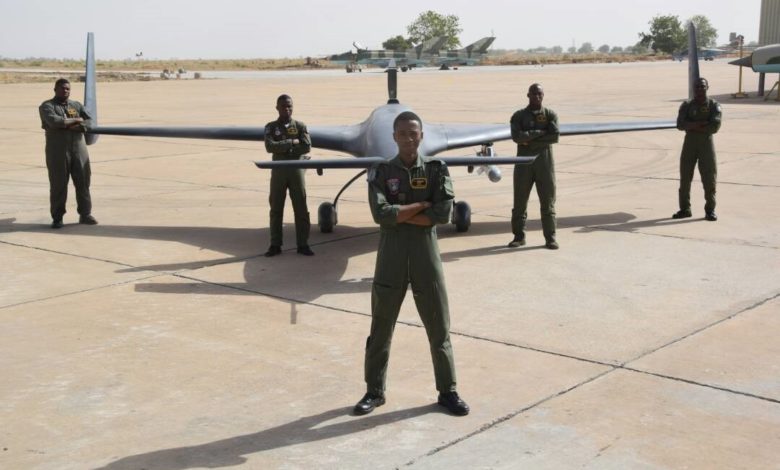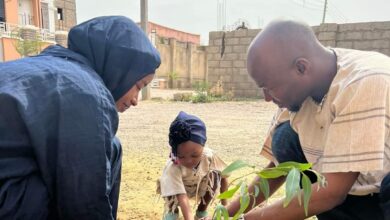Drones Are Game Changers In The War Against Terrorism

In February 2016, a military drone scouting the dreaded Sambisa Forest area zoomed in on a target – a gathering of Boko Haram insurgents.
They were in a compound at Garin Moloma about one kilometre north of the forest, once known for its distinct Savannah shrubs, baobab trees, and migratory elephant population but now a sanctuary for insurgents waging a decade-long war against Nigeria and its neighbours.
They were unaware a Nigerian Air Force CH-3A drone capable of deploying AR-1 guided missiles and YC-200 guided bombs was loitering above them and relaying information to a ground station.
Minutes later, the compound and the occupants within it turned into a huge fireball.
In the past few years, drones have become an increasingly important part of the Nigerian military’s arsenal in its war against Boko Haram and its splinter group, Islamic State West Africa Province.
They provide affordable and risk-free surveillance and armed variants like the CH-3A conduct airstrikes, with high degrees of precision and accuracy against targets. But the use of this semi-autonomous technology raises human rights and accountability concerns.
The Nigerian military embraced the use of drones in 2006 when the Air Force acquired Aerostar drones from Israeli Aeronautics Defence Systems for maritime surveillance of volatile Niger Delta and territorial waters. As the conflict in the Northeast escalated, the government acquired a set of four CH-3A drones from China in 2014 for the air force.
Fasasi Tosin, an aerospace engineer and founder of Demfas Aerosystems, a company developing N-ICON, a multipurpose single-engine drone, spoke to HumAngle of the advantages of drones.
“When it comes to security, visual coverage is really important. This is primarily what a drone will give you (aerial visuals). You know what is going on, how to plan or coordinate own troops, etc.”
In practise, drone pilots sit in a small booth located in an airbase, facing a screen and controlling a joystick similar to the ones video gamers use to operate the sophisticated remote-controlled aircraft. The pilots receive navigation instruction, birds-eye virtual feedback, and unleash guided missiles as in the case of the insurgents in Sambisa Forest.
A source familiar with Nigerian Air Force drone operations confirmed that armed drones were game-changers for the service and that, at least, one of them was operational in the Northeast. The service is expected to take delivery of a few more, the source added.
Drones have also become resourceful surveillance and unit support tools for the Nigerian Army and Nigerian Navy. Smaller and less sophisticated drones are common with law enforcement agencies tackling other security challenges.
For instance, in November, 2019, Kaduna State Commissioner for Internal Security and Home Affairs, Samuel Aruwan, disclosed that the state was in an advance stage of deploying drones to tackle insecurity. Recently, in Lagos State, drones were deployed by the Rapid Response Police to shadow and enforce COVID-19 social restrictions.
But the uptake of this technology, for public safety and security has led to rising human rights concerns and threats.
Jake Okechukwu Effoduh, a partner, Praxis & Gnosis Law, in an interview with HumAngle said: ““We have to ensure these drones aren’t autonomous, in the sense that they can’t carry out attacks without a human operator, with knowledge, insights and relevant intervention to be able to stop, hinder, retreat the use of these armed drones when they get hacked or malfunction.
“Nigerians need to know who to hold responsible where a violation occurs. Perhaps, we need to have a drone reporting unit as we begin to deploy these machines.”
Continuing, Effoduh said: “I think that mass surveillance through drones will not make Nigerians any safer, and it is fundamentally incompatible with the protection of our right to privacy in Chapter 36 of our constitution. It could hamper individuals’ liberties and the democratic values that we claim to live by.”
He suggested that drones be used within strict legal frameworks and accountability measures provided for Nigeria’s adoption of several related international laws.
In response to a question on rules of engagement guiding drone operation and measures taken to prevent civilian casualties, the military source replied, “ours is peculiar in the sense that the areas where we strike are mostly deserted, habited only by Boko Haram; or otherwise buildings where there are a number of Boko Haram insurgents, artillery weapons or gun trucks.
The drones aren’t really unmanned, the drone pilots are seeing everything and just the same manned aircraft protocol that works when women and children are visible in the vicinity of a strike, the mission is aborted.”
While drones are providing extra eyes and improving operations of security forces in Nigeria, it is clear that a balance must be struck with strengthening transparency, addressing privacy as well as human rights concerns.
Support Our Journalism
There are millions of ordinary people affected by conflict in Africa whose stories are missing in the mainstream media. HumAngle is determined to tell those challenging and under-reported stories, hoping that the people impacted by these conflicts will find the safety and security they deserve.
To ensure that we continue to provide public service coverage, we have a small favour to ask you. We want you to be part of our journalistic endeavour by contributing a token to us.
Your donation will further promote a robust, free, and independent media.
Donate Here




